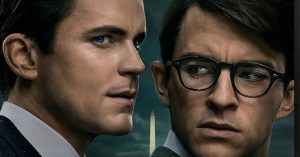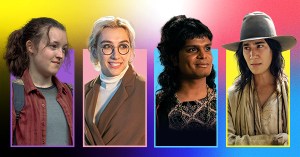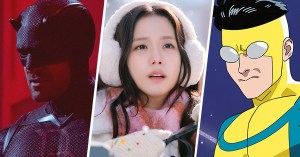Hello Tomorrow! Star Billy Crudup and Cast on the Retro-Optimism and Heartbreaking Drama of the Sci-Fi Series
From flying cars to family drama, the cast and creatives break down the influences, themes, and conflicts of Apple TV+'s new sci-fi series.
Billy Crudup’s Jack in Apple TV+’s new sci-fi series Hello Tomorrow! may come off as a con man, but he’s really a true believer, Crudup says.
The series takes place in a retro-future world where a group of traveling salesmen go door-to-door with the goal of selling timeshares on the moon. The Emmy winning actor fronts the cast as a gifted salesman full of charisma and an unshakeable faith that a better future is right around the corner – and it’s up to them to deliver it to the masses. But the deeper they go in this mission, the more Jack gets lost in the very dream he and his team are trying to sell.
Nicholas Podany co-stars as Joey, the bright-eyed newcomer to the team; Hank Azaria as the seasoned-yet-flawed salesman Eddie; Haneefah Wood as no-nonsense office manager Shirley; Dewshane Williams as the by-the-book salesman Herb; Jacki Weaver as Jack’s mother Barbara; and Alison Pill as Myrtle, a desperate housewife with a dark secret.
The show’s cast and co-creators Amit Bhalla and Lucas Jansen talked with Rotten Tomatoes about the style and substance, dreams and delusions, and the deeply human drama that exists at the center of this surreal sci-fi story.
Here are five things you need to know about Hello Tomorrow!
1. They are selling a dream and potentially running a con
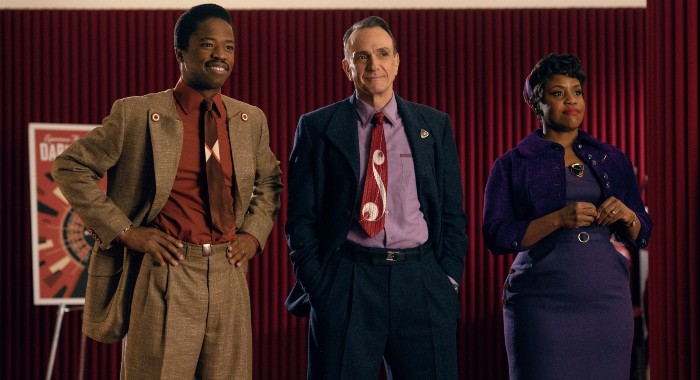
(Photo by Apple TV+)
Selling lunar timeshares sounds like a lucrative line of work, especially in this world where traveling to the moon is a reality. But we get the impression there is something a bit more insidious at work. After all, selling the vision of hope and the idea of a better tomorrow can only go so far without the substance to back it up.
“If you’re running a con, salesman skills are a good thing to have,” Azaria told Rotten Tomatoes. “They suit Eddie, because I think he’s in a constant state of messing his way through life. Why should this job be any different?”
Each of the salespeople on Jack’s team come to the line of work with their own delusions that, they too, can break free from the banal nature of their every day lives. Whether it’s office manager Shirley, who, as Wood explained, has “more purpose and more drive” in this line of work, thanks to Jack, or Herb who “would follow Jack anywhere,” according to Williams, their magnetic leader’s belief in their mission keeps everyone in-line.
“He is a firm believer,” Crudup said of his character. “He is someone who is committed to the idea of a better future through commodification. That’s it really. He firmly believes that he can make your life a little bit brighter by something that he maybe delivers or maybe doesn’t deliver. That moment of hope that you had was worth the price.”
2. 1950s advertising, Norman Rockwell, and Frank Capra were all inspirations
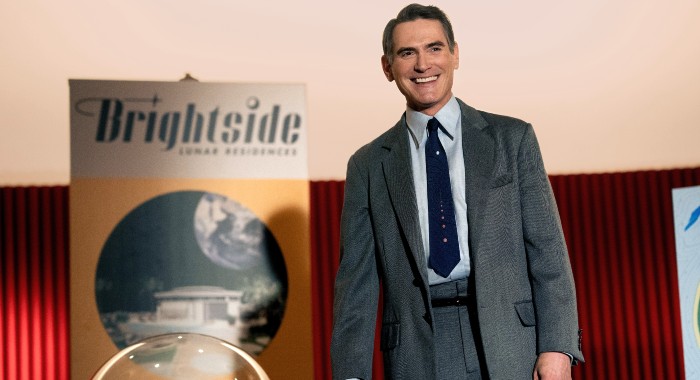
(Photo by Apple TV+)
The production design, costuming, world-building, and obsessive attention to detail comes together in one of the more unique programs to hit TV in recent years. Stylistically, Bhalla and Jansen explained they dug deep into a variety of inspirations to bring Hello Tomorrow! to life.
“Essentially, advertising from the World’s Fair in the ’30s through the ’60s, when a corporate American futurism was born as an art form,” Bhalla said. “This is a show that has an aesthetic built off of advertising and off of a kind of aesthetic Utopia. Well, what happens when you really live in it but the robots are a little rusty, things don’t work, and the carpet is stained?”
This is also a series that throws a mirror up to the American dream, as a concept, which of course means there’s a bit of Norman Rockwell thrown in there, for good measure. Bhalla referred to is as “the kind of delusional imagery – or optimistic imagery – that made the American spirit kind of form itself.”
Tying a ribbon around the whole package is a specific storytelling technique of the early days of cinema.
“Billy Wilder, Preston Sturges, and Frank Capra; we’re deep in those tones,” Bhalla added. “That juxtaposition between high jinks and heartbreak, soap and noir, and all of these things that they were able to put into one movie. We knew that by doing that, it would feel older, that we would able to create a kind of meta narrative of nostalgia through tone.”
3. Unrealistic dreams vs. heartbreaking delusion is the main theme of the series
“This is a story about dreamers,” Jansen said.
Whether they’re selling a dream to others or riding Jack’s coattails to pursue their own optimistic vision of a better future, the series is immersed in a hopeful fantasy that things will get better if your faith and belief is strong enough. But what happens when that isn’t enough?
“The show is set in a dream or a delusion that we all as Americans kind of share,” Jansen added. “It’s set in a world that is a delusion, but we’re playing it as a reality. So there’s a robot shaking your martini in the back, but he’s also a little rusty and sometimes he spills a little, and you’re playing a scene in the foreground that’s full of heartbreak. The way all of that comes together says something about how we construct our lives as Americans and how our dreams both inspire and wreak havoc on us.”
4. The robots and gadgets in the show are all practical
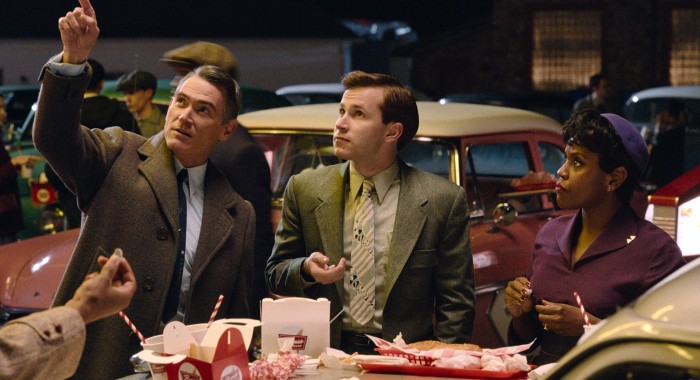
(Photo by Apple TV+)
There are a plethora of peculiar robots and gadgets sprinkled throughout the story world, making Hello Tomorrow!’s dream-like reality feel oddly grounded. According to Jansen, “We would just make up names for things and see what they came up with on set.”
That translates into a world filled with robot bartenders, sentient briefcases, and Ford Fairlane–style hover cars. And those examples just crack the surface.
To make things feel as tactile as possible, Azaria noted this retro-future tech was all practically made: “Those robots weren’t CGI. There were puppeteers there with us – these guys in green unitards that can be green-screened out later. We’re operating them. It was really insane.”
5. A complicated father-son relationship exists at the show’s core
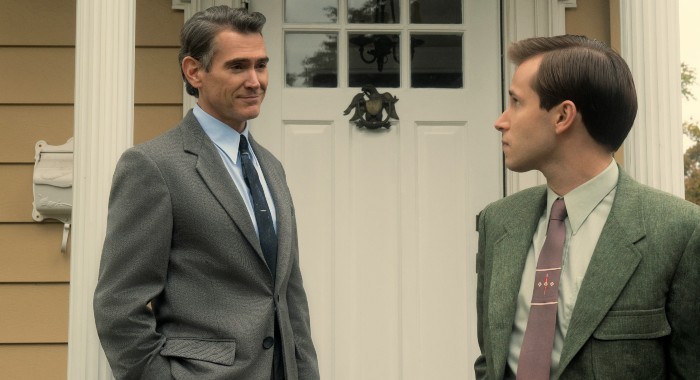
(Photo by Apple TV+)
All these magical sci-fi elements build a world that feels as familiar as it is just out of reach. Nostalgia and optimism can only get you so far, though; human drama resides at the story’s core.
The introduction of Joey to the team doesn’t just offer fresh young energy to the group, but as Crudup explained, he “represents a new opportunity, a rebirth, a chance to redefine himself in a way that he thought he might never recover from.”
Or, to put it a different way: Jack is the deadbeat dad Joey never knew, and Joey doesn’t know that.
“He’s grown up without that father figure,” Podany added. “He’s started thinking that the dreams of him getting out of town are fictitious, just in time for Jack to come along and tell him that enough is never enough. That all of those dreams and all of those buried desires are real and valid. And not only are they valid in you, they’re valid in others, and you can change people’s lives with just a dream. What a dangerous little message that is.”
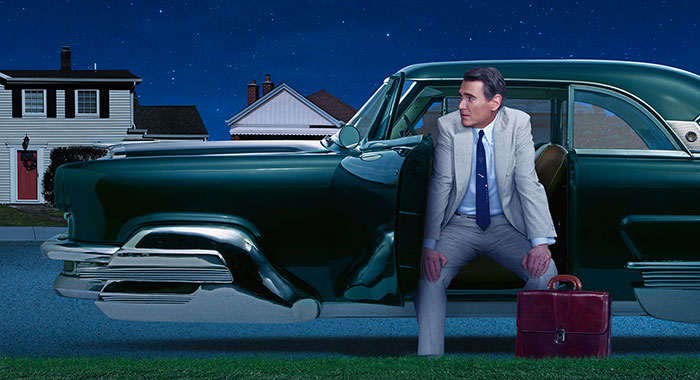
(Photo by Apple TV+)
Joey’s need for a father figure and Jack’s desire to make peace with his past transgressions, no matter how selfish his actions become, converge in a layered drama that informs the entirety of the show’s first season.
“To get the opportunity to get to parent, metaphorically, in a way, as a mentor, this young man is a chance for him to reinvent himself,” Crudup continued. “That happens as a parent, regardless, right? Unless you’re like Jack and you go on the road for a while. He missed what we all take for granted for in the day-to-day grind of being a parent. And so for him, it feels like this is an opportunity for him to reclaim that experience that maybe he lost.”




